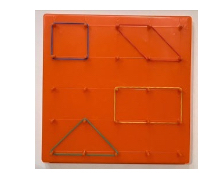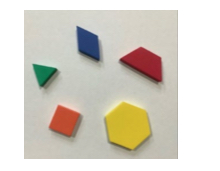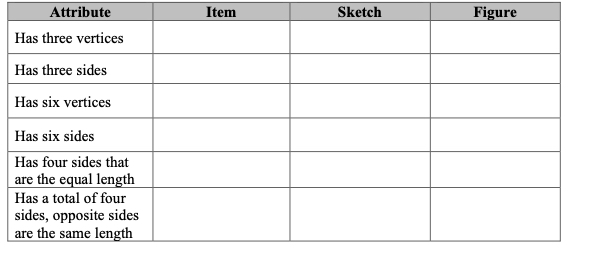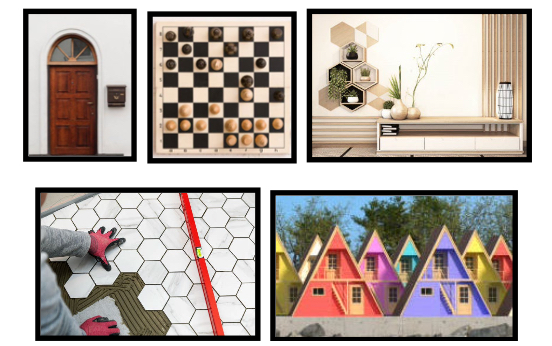Sketch two-dimensional figures when given defining attributes. Figures are limited to triangles, rectangles, squares and hexagons.
General Information
Subject Area: Mathematics (B.E.S.T.)
Grade: 1
Strand: Geometric Reasoning
Standard: Identify and analyze two- and three-dimensional figures based on their defining attributes.
Date Adopted or Revised: 08/20
Status: State Board Approved
Benchmark Instructional Guide
Connecting Benchmarks/Horizontal Alignment
- There are no direct connections outside of this standard, however teachers are encouraged to find possible indirect connections.
Terms from the K-12 Glossary
- Triangle
- Rectangle
- Square
- Hexagon
Vertical Alignment
Previous Benchmarks
Next Benchmarks
Purpose and Instructional Strategies
The purpose of this benchmark is to allow students to use their understanding of the various attributes to sketch a two-dimensional figure. In Kindergarten, students identified, compared and found real world two-dimensional figures of circles, triangles and rectangles regardless of their size or orientation; however, they did not formally sketch the figures (MTR.5.1).- Instruction includes guiding students to use defining attributes such as number of sides, number of vertices and side lengths to draw two-dimensional figures. Students are not expected to use a ruler or straight edge to draw a more precise figure until Grade 2 (MTR.5.1).
- Instruction includes the use of graph paper, grid paper or dot paper to assist students with drawing figures.
- Instruction includes the use of both formal and informal language.
Common Misconceptions or Errors
- Students may get confused when asked to draw a two-dimensional figure that has four sides and four vertices. With only those attributes given, students could draw a square or a rectangle as either is acceptable given those attributes.
Strategies to Support Tiered Instruction
- Teacher provides opportunities to build shapes on a geoboard as attributes are called out. Once successful, students draw the representation in the math journal or on geoboard paper.

- Teacher provides pattern blocks and asks students to find the shape with specific attributes (such as 3 sides and 3 vertices). The students choose from the group of pattern blocks the shape that matches the attributes and trace the correct shape in the math journal.

Instructional Tasks
Instructional Task 1 (MTR.7.1)
Place the pictures of triangles, rectangles, squares and hexagons from below around your classroom to ensure students have additional items to choose from, students may recognize other objects in the classroom as well. Some photos contain multiple figures that students could use for their sketches.- Part A. Look around your classroom for items that have the same attribute as listed. Sketch the items and label what you found.
- Part B. Compare with a partner and explain how you know your items have those attributes. Discuss what you notice about the sketches for items that have three vertices and the sketches that have three sides.


Instructional Items
Instructional Item 1
Draw a figure with six sides and six vertices. What figure did you draw?
Instructional Item 2
Draw a triangle, how do you know it is a triangle?
*The strategies, tasks and items included in the B1G-M are examples and should not be considered comprehensive.
Related Courses
This benchmark is part of these courses.
5012030: Grade One Mathematics (Specifically in versions: 2014 - 2015, 2015 - 2022, 2022 - 2024, 2024 and beyond (current))
7712020: Access Mathematics Grade 1 (Specifically in versions: 2014 - 2015, 2015 - 2018, 2018 - 2022, 2022 and beyond (current))
5012005: Foundational Skills in Mathematics K-2 (Specifically in versions: 2019 - 2022, 2022 - 2024, 2024 and beyond (current))
Related Access Points
Alternate version of this benchmark for students with significant cognitive disabilities.
MA.1.GR.1.AP.2: Produce two-dimensional figures when given defining attributes. Figures are limited to triangles, rectangles and squares.
Related Resources
Vetted resources educators can use to teach the concepts and skills in this benchmark.
Formative Assessments
Lesson Plans
MFAS Formative Assessments
Draw Triangles:
Students draw two triangles and are prompted to describe the triangles in terms of defining attributes.
Student Resources
Vetted resources students can use to learn the concepts and skills in this benchmark.
Parent Resources
Vetted resources caregivers can use to help students learn the concepts and skills in this benchmark.







